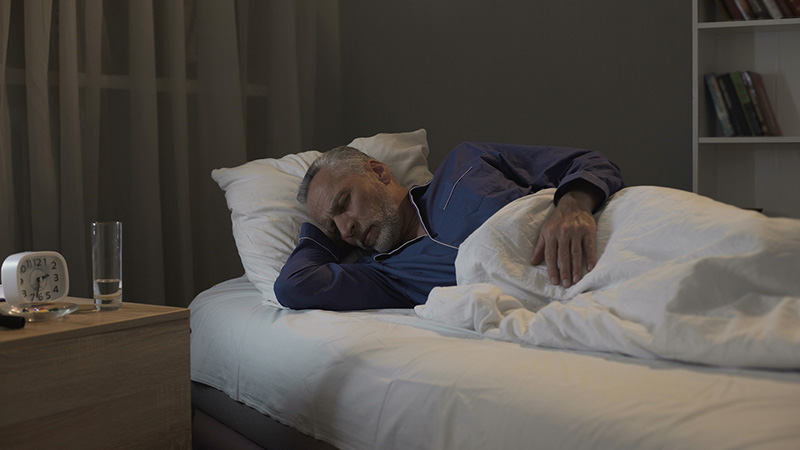Samuel Chang, MD, Diplomate of American Academy of Sleep Medicine
Our knowledge about how sleep changes with age has grown significantly over the past few decades. Researchers have shown that there are typical age-related, normal changes that occur in sleep architecture and sleep patterns. However, aging is also accompanied by a variety of sleep complaints and sleep disorders.
Insomnia
Studies have found insomnia, defined as the inability to initiate or maintain sleep resulting in daytime consequences, to be the most common sleep disturbance in older adults, with up to 40%–50% of those over the age of 60 reporting disturbed sleep. Complaints range from difficulty falling asleep, to difficulty with sleep maintenance to frequent nighttime awakenings and early morning awakenings. Gender differences exist as well, with women being more likely to complain about insomnia than men
Depression and Anxiety
Depression and anxiety are common causes of transient insomnia. However, it is even more present in the elderly population, since depression is often a result of serious life events such as death of a loved one, which can trigger long lasting chronic insomnia. Depression and insomnia have been shown to be associated to one another. Depression can cause insomnia, and insomnia can cause depression. Older women with insomnia seem to be especially susceptible to depression. It has been suggested that treating insomnia may also improve depression.
Medical Problems Are Associated with Poor Sleep
Medical problems have been shown to be associated with poor sleep. Pain caused by osteoarthritis, shortness of breath due to chronic obstructive pulmonary disease or congestive heart failure, nocturia due to enlarged prostate and incontinence, and neurologic deficits related to a history of stroke or Parkinson’s disease all can lead to difficulty falling asleep and also difficulty staying asleep. Additionally, reports of trouble with sleep have shown to be strongly correlated with complaints about health and depression. Studies examining the prevalence of sleep disturbances in patients with chronic medical diseases have reported that 31% of arthritis and 66% of chronic pain patients report difficulty falling asleep, while 81% of arthritis, 85% of chronic pain, and 33% of diabetes patients report difficulty staying asleep.
Sleep problems associated with dementia.
Individuals with dementia have been shown to have even more difficulty with sleep. Alzheimer’s disease, Parkinson’s disease, multi-infarct dementia, Lewy Body dementia, can result in irreversible damage to the brain in areas responsible for regulating sleep. In general, patients with dementia have disturbed sleep at night, and laboratory sleep studies of demented patients have found increased sleep fragmentation and difficulty falling asleep, decreased total sleep time, and decreased slow wave sleep. Sleep appears to become more disturbed as dementia worsens.Some common issues seen in patients with dementia include excessive daytime sleepiness, nighttime wandering, confusion and agitation, which is also known as sundowning. Part of the challenge of treating sleep difficulties in patients with dementia includes the interaction with other chronic medical issues, such as chronic pain, circadian rhythm changes, and disordered breathing.
Treatments
Behavioral treatments have been shown to be the most effective in the treatment of insomnia. Sleep hygiene is the most important first step in an approach to sleep problems. Poor sleep hygiene practices can be associated with behavioral patterns that interfere with sleep. Patients should be educated on how to identify specific factors that may be disturbing their own sleep. Alcohol use should be avoided since it exacerbates sleep problems and results in early morning awakenings.
In the elderly, sedating medications including benzodiazepines, tricyclic antidepressants, antihistamines, anticonvulsants and antipsychotics are frequently prescribed for the nighttime restlessness associated with dementia. However, attempting to enhance sleep continuity with these medications may paradoxically result in increased sleep disturbance and daytime sleepiness (“hang over effect”) which may result in impaired motor and cognitive functioning. Therefore, in general, nonpharmacologic interventions are preferred.
Principles of Sleep Hygiene
- Do not spend too much time in bed
- Avoid television or other screen time just before bed
- Maintain a consistent sleep/wake time
- Get out of bed and READ if unable to fall asleep
- Restrict naps to 30 minutes in the late morning or early afternoon
- Exercise regularly
- Spend more time outside, especially late in the day
- Increase overall light exposure
- Eat a light snack (i.e. milk, bread) before bed
- Avoid caffeine, tobacco, and alcohol after lunch
(Adapted from article by JR Cooke et al, Normal and Abnormal Sleep in the Elderly, Handb Clin Neurol. 2011; 98: 653–665. )

